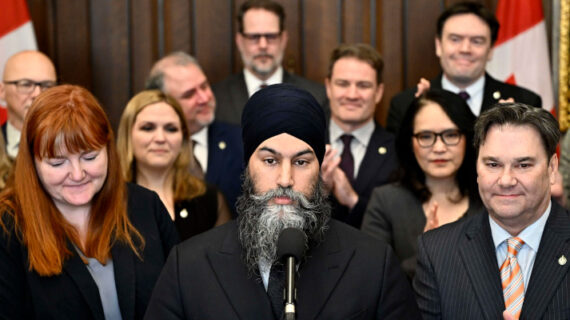Six weeks ago, the Public Order Emergency Commission report concluded, with some quixotic language, that the Trudeau government was justified in invoking the Emergencies Act on Feb. 14, 2022.
That report was deemed by government lawyers to amount, for legal purposes, only to a persuasive “expression of opinion” without legally binding consequences in a Federal Court hearing held this past week in Ottawa.
Held in an impressive courtroom in the Supreme Court of Canada building metres away from last winter’s boisterous Freedom Convoy demonstrations, the hearings carried a sense of sober gravitas, of picking up the debris after the arena had been emptied out and the players long gone home.
The applicants, a group of civil liberties organizations and individuals (including the Canadian Constitution Foundation, where I am the executive director), argued for a declaration that the government improperly invoked the Emergencies Act. The Act operates like a de facto constitutional amendment, vesting cabinet with draconian powers, including the power to make new criminal laws without parliamentary debate or advance notice. It carries strict statutory conditions for its invocation—that a threat to national security exists which cannot be dealt with under any other law in Canada. Those conditions, the applicants argued, were not met.
The thrust of the government lawyers’ legal argument defending the use of the Act was twofold. First, they called out the applicants for playing Monday-morning quarterback, engaging in revisionist history, and dissecting the fine threads of what was a fast-moving and volatile situation. The attorney general emphasized the grave concern, in early February 2022, about spillover violence, citing the weapons retrieved in Coutts, AB. They were concerned that if Coutts didn’t end peacefully, it might create a chain reaction across the country. The Convoy had metastasized into a national political movement that completely overwhelmed police.
The correct standard for judicially reviewing the government’s decision to invoke the Act, the government claimed, ought to be highly deferential. The situation perhaps, in hindsight, looked like it was under control by the time the Act was invoked on February 14, 2022—but in reality, the entire country looked like a tinderbox on the verge of exploding.
Boldly, the government also argued that cabinet’s authority was essentially unlimited as an apex decisionmaker and unconstrained by the language of the Emergencies Act itself, such that an assertion that it believed itself to be acting reasonably ought to suffice. Cabinet and its governor-in-council, the attorney general argued, was “quintessentially executive in nature, unconstrained” and its decisions should be considered “very difficult to set aside.” Given that Canada’s parliamentary democracy is already lacking in meaningful checks on executive power, the government’s position would seemingly emaciate any basis for meaningful judicial review.
These assertions carried an alarming whiff of deja-vu which recalls the original impetus for enacting the Emergencies Act in 1988 in the first place. The specific parliamentary intent evidenced in the language of the Emergencies Act itself was to render it less liable to abuse. In Parliament, the Emergencies Act was enacted to replace the War Measures Act specifically to move away from the latter’s loose requirement that cabinet need only be “of the opinion” that an emergency existed, in favour of a more stringent requirement that it believed “on reasonable grounds” that a public order emergency existed. This requirement was referred to in connection with an explicit reference to the importance of meaningful judicial review. Minister Beatty said at the time that the requirement was meant “to give someone who wants to contest the government’s declaration […] the ability to take us to court, if they believe that it has been frivolously done,” and that “the government could be required to explain to the courts the reasoning by which it concluded that a declaration of national emergency was the appropriate action.”

Justice Mosley lamented the government’s dragged-out evidentiary disclosure, calling the process “like peeling an onion.” From the commencement of litigation in spring 2022, the government asserted near-blanket privilege over the relevant Incident Response Group proceedings. They waived privilege in July 2022 over broad swaths of intra-governmental communications leading up to the invocation, only to assert solicitor-client privilege over a legal opinion laying out their justification for invoking the Act, the nub of the issue.
Secrecy aside, it can be surmised at this point that in the government’s view, despite the adoption of the CSIS Act’s definition of “threats to the security of Canada” in the Emergency Act’s threshold for invocation, CSIS’s conclusion that such a threat didn’t exist was immaterial to Cabinet’s decision to invoke the Act.
Which leads to a few pesky questions about what inputs, exactly, did form the basis for Cabinet’s decision. We know that the day the Act was invoked, national security advisor Jody Thomas ordered that cabinet produce its own separate threat assessment. A second memo, from Clerk of the Privy Council Janice Charrette to the prime minister giving advice about invoking the Act also indicated that a separately conducted threat assessment was to be conducted. That assessment never materialized. According to the attorney general, in the fog of war this was understandable and not fatal to the reasonableness of cabinet’s decision. The cabinet, apex-decision maker, may be presumed to be acting reasonably, and it would seem, to be omniscient.
That’s the most difficult question for Justice Mosley to decide. In deploying the Emergencies Act, may cabinet not just depart from the threat assessments of CSIS (as well as on-the-ground law enforcement, who also concluded no national security threat existed), but also do so in an evidentiary vacuum? “Is there a particular magic to the alternative threat assessment?” the judge queried of counsel at the hearing. The position of civil liberties groups is that, in light of the Act’s requirements, the government cannot have its cake and eat it too: on the one hand, dismiss CSIS and the police’s conclusions that a threat didn’t exist and on the other hand be entitled to deference and a lack of a demonstrable basis to conclude otherwise.
Justice Mosley has a background in national security, and referred several times during the hearing to his personal experience reviewing thousands of CSIS threat assessments. It’s hard to know whether this will militate in the government’s favour or not. He noted the novelty of the second major issue before him: the relationship between the CSIS Act and Emergencies Act. At the time the Emergencies Act received assent, the CSIS Act itself had also been recently adopted and its statutory requirement of a “threat to the security of Canada” was a low one, meant to merely grant scope for surveillance and further investigation of individuals. In the context of the Emergencies Act, that same standard was deployed to permit freezing of bank accounts and suspension of peaceful assemblies across the entire country. If anything, then, the CSIS Act definition should be more rigorous to satisfy, but the position of the government, accepted by the Rouleau Commission, was far more accommodating.
The government’s claim that cabinet’s authority is essentially unlimited and unconstrained by the language of the Emergencies Act would set a precedent that would allow the government to skirt virtually all statutory guardrails. One hopes Justice Mosley will peel back the layers of this onion with clarity.




